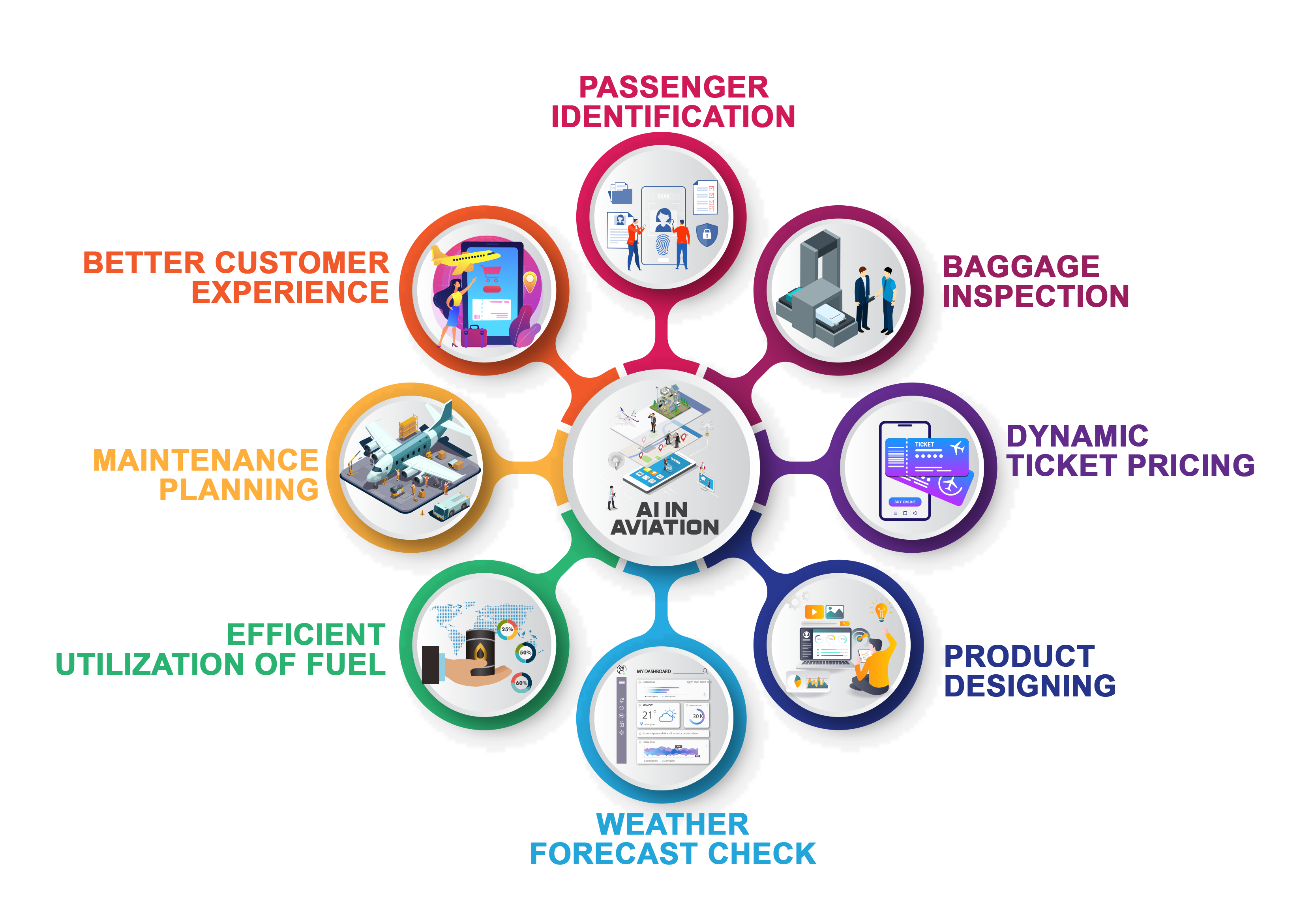AI in Aviation
Almost one-third of trade in terms of value is sent by air, making aviation an important factor in the growth of the global economy.
AI is expected to significantly advance the aviation sector by lowering costs, speeding up design processes, and removing duplication, experimentation, augmentation, support, and updation.
Artificial Intelligence technology could be pivotal in transforming the face of travel. From the outset, AI rests on a solid footing of 5 key pillars, namely:
- Machine Learning
- Deep Learning
- Natural Language Processing
- Computer Vision
- Blockchain
How is artificial intelligence being used in aviation?
Airline businesses are now leveraging AI to enhance customer experience and streamline operations.
Aviation Slot Management and Scheduling
Flight slot management and scheduling are some of the crucial challenges that the aviation businesses face. This particular system helps in preventing delays and overloads of air traffic at airports. With the utilization of AI capabilities, flight slot management software can analyze and forecast the demand of individual flights, thus helping businesses to make better decisions.
Operations Management Systems
There is a dire need for the right software solution that can streamline your flight operations management, keep everything on schedule and reduce the waste of time and resources. With AI in airport management systems, it is possible for aviation businesses to streamline their flight planning, crew scheduling, maintenance tracking, aircraft dispatch, and other processes.
AI for Airline Tracking
Using big data analysis it is possible to know about the purchase history, tracking techniques built into AI systems, AI-based biometric security systems, facial recognition, fingerprint, and retinal scanning are already being used in airports and airlines to identify changes in passenger behaviour. Dynamic pricing models powered by AI are used by businesses to optimize ticket rates based on data about passenger travel.
AI in Aviation Maintenance
AI may soon be employed in aircraft maintenance and repair. To find out how successfully AI can improve maintenance planning and aircraft capacity, experiments are currently underway. AI in aviation maintenance
It has the potential to lessen the requirement for routine maintenance by only initiating repairs when they are required. By leveraging information from operating aircraft, it can also anticipate potential problems with airplanes. Algorithms will enable AI to foresee flight delays and aircraft problems.
What are the benefits of incorporating AI into aviation?
Some of the advantages of AI in aviation industry:
- Passenger identification
- Baggage inspection
- Dynamic ticket pricing
- Product designing
- Weather forecast check
- Efficient utilization of fuel
- Supply chain management
- Maintenance planning
- Better customer experience
What is the role of machine learning in aviation?
By monitoring airplanes and spotting irregularities, machine learning algorithms and IoT can assist carriers in reducing the costs of unscheduled maintenance.

The machine learning algorithm will monitor the aircraft’s technical status in real-time and alert technicians to any potential issues. In today’s predictive maintenance solutions for the aviation industry, machine learning has become essential. Large amounts of diverse data may be processed by its clever algorithms, which can also remove extraneous data points to get precise snapshots of particular aircraft components.
How can AI help to improve aircraft safety and security?
AI video analytics-enabled cameras become proactive security systems that can identify security concerns in real time. In high-impact events, they are used to enhance situational awareness and automate response. Airport managers may make wise judgments about managing airport performance to boost operational effectiveness and improve customer experience
- Improve your situational awareness
- Perimeter security
- Prevent illegal access
- Detecting FOD automatically
- Boost operational effectiveness
- Detection of falls and slips
- Detection of unattended and misplaced luggage
- Thermal filtration
What are the future possibilities for AI in aviation?
Better predicting abilities are promised by artificial intelligence and deep learning algorithms, but these systems can only truly excel when combined with the adaptability and human touch of a data analyst. Artificial intelligence has a great deal of potential for use in fields with complicated scenarios, such as the improvement of support for pilots, airport operators, flow controllers, and cybersecurity officers. Thus, we can foresee a great future of AI, as the upcoming days will see business operations being controlled by bots.
For further assistance, visit our channel and refer the video named AI in Aviation or click the link.


